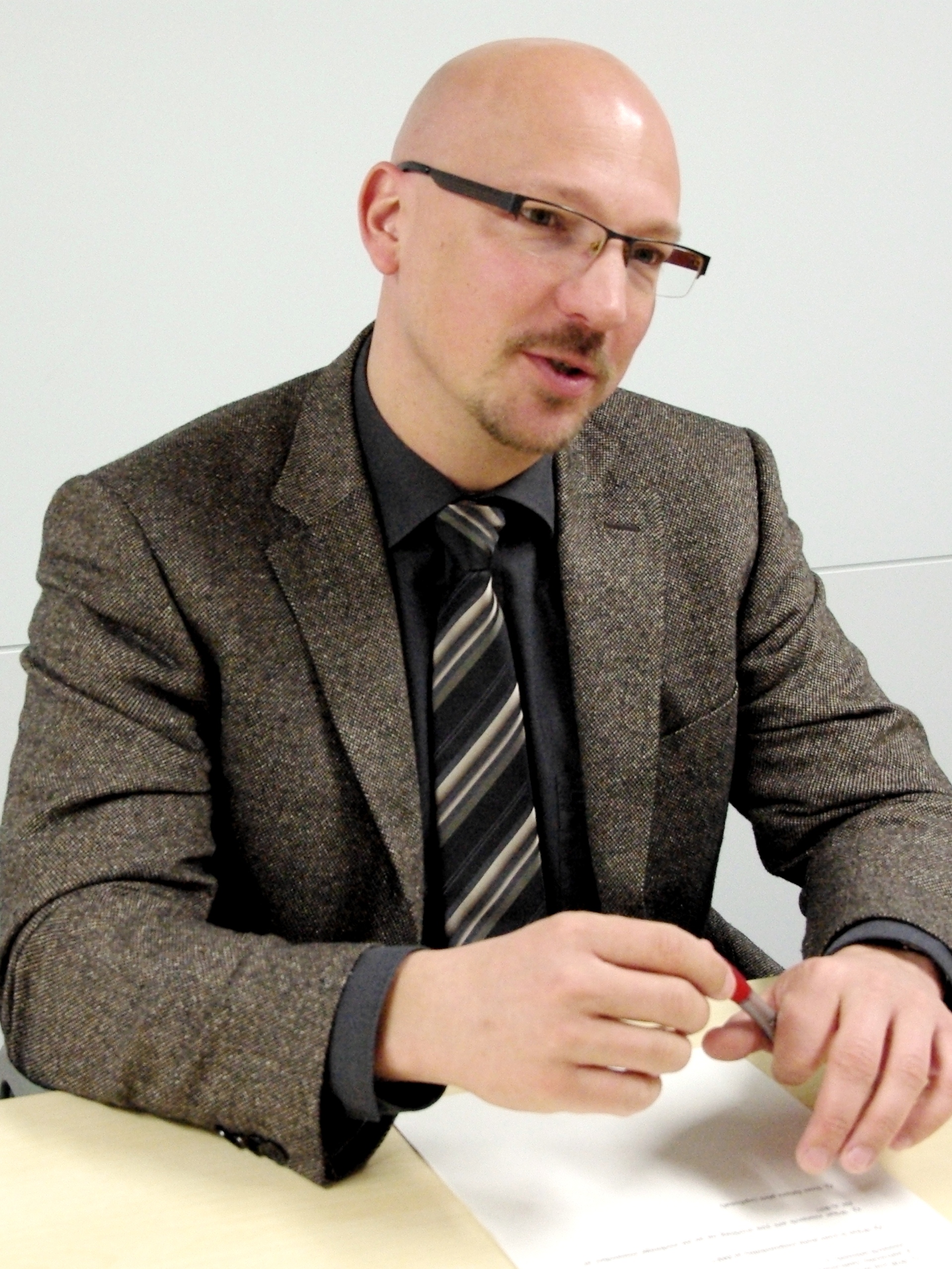Interview【JICA-RI Focus Vol.27】 Interview with Stefan Leiderer, Senior Researcher of DIE
2014.04.08

JICA-RI interviewed Mr. Stefan Leiderer, Economist of German Development Institute (Deutsches Institut für Entwicklungspolitik: DIE). He has been staying at JICA-RI for three weeks as Visiting Scholar on an exchange program between JICA-RI and DIE. He spoke of his educational background, his tasks at DIE along with DIE’s collaboration with JICA-RI.
I mainly studied in Germany, but during my high school years and university years, I’ve spent some time abroad. I spent a year in Argentina, one year in France, and eight months in China, trying to learn the respective languages. Speaking Spanish and French is useful for my work. Since my focus area is Sub-Saharan Africa, French is particularly useful in Western Africa’s francophone countries.
In Germany, I studied at the Universities of Mannheim and Heidelberg, with a specialization in development economics, industrial economics, and international management. After finishing my Master’s degree at the University of Mannheim, I participated in the postgraduate training program at German Development Institute (DIE). After those nine-month postgraduate training, DIE offered me a staff position as a researcher and directly recruited me out of this training program. This was in 2003. DIE is a quite international organization with many foreign researchers. So, our working language is English.
At first, I worked in the Africa Department, which later became the Department for bi-and multilateral development cooperation. My responsibilities with DIE for the last ten years have been working mainly on questions around aid effectiveness, budget support and public finances, mostly with a focus on Sub-Saharan Africa. In recent years I have also developed a strong interest in methods for impact evaluation.
My responsibilities cover all three pillars of DIE: research, policy advice, and training.
In research, my focus in the past has been on aid effectiveness and aid modalities, in particular on budget support. I have published a number of papers and articles on the topic and participated in a large joint international evaluation of budget support in Zambia. In parallel to this evaluation, I have co-led a research program on evaluation methodologies for budget support. Currently I am co-leading a research program on aid effectiveness at DIE, in which we cover a number of specific topics such as results-based approaches in aid, capacity development and use of country systems, the use of indicators in results monitoring and performance assessment in aid, or questions around allocative efficiency of aid resources. I am also currently finalizing my doctoral thesis that focuses on the political economy of public finances in aid recipient countries.
With regards to policy advice activities, my responsibilities include providing advice to the German government and German aid implementation agencies, serving as an expert in parliamentary hearings or occasionally for the European commission and others.
Since DIE was founded in 1964, one of the main purposes of the Institute has been the training on the German aid system. As part of my responsibilities in teaching and training activities, I give lectures on the German aid system, aid instruments and modalities, methods of impact evaluation, and public finance in DIE’s postgraduate program. In the past, I have also taught a course in evaluation at University of Bonn. As part of my responsibilities in DIE’s postgraduate training program, I have conducted a number of research projects in Sub-Saharan Africa, including two three-month field studies on public financial management at local government level in Malawi and Zambia, respectively, where I supervised teams of five postgraduate trainees.
One objective of my stay was to hold an open joint workshop on “the politics and impact of non-coordination in international aid.” Stephan Klingebiel, head of my department at DIE came to participate in the workshop as one of the presenters along with Executive Senior Research Fellow Mitsuaki Furukawa and Senior Research fellow Satoru Mikami of JICA-RI.
I am currently working on an empirical paper on political targeting of infrastructure investment in Zambia, which I presented at a seminar in Tokyo. In between, I try to get a better understanding of the interesting on-going research here and gauging the possibilities for further cooperation between JICA-RI and DIE in the future.
DIE definitely has an interest in this personal exchange. We have regularly guest researchers from all kinds of institutions. I know a number of colleagues who would be very interested in coming to Tokyo. The main difference between DIE and JICA-RI is certainly that JICA-RI is part of JICA, whereas DIE functions as a stand-alone institution. That is certainly a difference in the institutional set-up: when it comes to how our budget works, for example. But in terms of research interests and topics, I think there is a lot of overlap and there will definitely be options to cooperate more closely. I have already had a number of interesting discussions with other researchers at JICA-RI. My interests during my stay are to understand the way how you work at JICA-RI and to engage in exploring the options for the future cooperation.

事業事前評価表(地球規模課題対応国際科学技術協力(SATREPS)).国際協力機構 地球環境部 . 防災第一チーム. 1.案件名.国 名: フィリピン共和国.

事業事前評価表(地球規模課題対応国際科学技術協力(SATREPS)).国際協力機構 地球環境部 . 防災第一チーム. 1.案件名.国 名: フィリピン共和国.

事業事前評価表(地球規模課題対応国際科学技術協力(SATREPS)).国際協力機構 地球環境部 . 防災第一チーム. 1.案件名.国 名: フィリピン共和国.

事業事前評価表(地球規模課題対応国際科学技術協力(SATREPS)).国際協力機構 地球環境部 . 防災第一チーム. 1.案件名.国 名: フィリピン共和国.

事業事前評価表(地球規模課題対応国際科学技術協力(SATREPS)).国際協力機構 地球環境部 . 防災第一チーム. 1.案件名.国 名: フィリピン共和国.
scroll